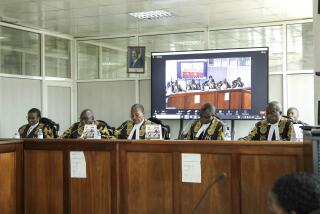Editorial: A judicial ‘no’ on gay conversion therapy
Whatever you think of therapy designed to change people’s sexual orientation — and we think it’s both harmful and insulting to gays and lesbians — it’s not constitutionally protected free speech. That was the correct conclusion of a federal appeals court decision upholding a California law prohibiting use of such therapy on minors. This week the Supreme Court rightly declined to hear an appeal of that decision.
In declining to review the ruling by the U.S. 9th Circuit Court of Appeals, the justices didn’t set a national precedent. But their unwillingness to take up this issue is likely to encourage additional states to pass laws against treating children and adolescents with conversion or “reparative” therapy. It will also be harder now for proponents of the therapy to argue, as they did in this case, that it is a form of free speech deserving of the strongest judicial protection.
Initially, this page opposed enactment of the California law, not because we approved of conversion therapy for minors or anyone else but because we didn’t believe legislators should be in the business of setting detailed rules for medical or psychiatric professionals. (We have similar misgivings about legislation restricting doctors who perform abortions.) Our preference would have been for the medical and psychological professions to lead the way in discouraging a form of treatment that is increasingly viewed as pointless and even dangerous.
But whether the California law is wise is a different question from whether it violates the 1st Amendment’s free speech protections. On that issue, the 9th Circuit correctly drew a distinction between expressing an opinion about conversion therapy and actually engaging in it with underage patients.
Writing for the appeals court, Judge Susan P. Graber declined to subject the law to the “strict scrutiny” with which courts consider laws that abridge free speech. She concluded that the law “regulates only treatment, while leaving mental health providers free to discuss and recommend, or recommend against” efforts to change sexual orientation. As this page has noted, a doctor has a right to express the opinion that a banned drug would be helpful to his patients, but that doesn’t mean he can violate the law by engaging in the “speech” of writing a prescription for that drug.
The line between speech and conduct for 1st Amendment purposes is admittedly sometimes blurry, but this law was aimed clearly at conduct. Even as it goes into effect, those who believe in conversion therapy can continue to evangelize for it. But they will be doing so to an increasingly skeptical public inside and outside the psychiatric profession.
More to Read
A cure for the common opinion
Get thought-provoking perspectives with our weekly newsletter.
You may occasionally receive promotional content from the Los Angeles Times.






